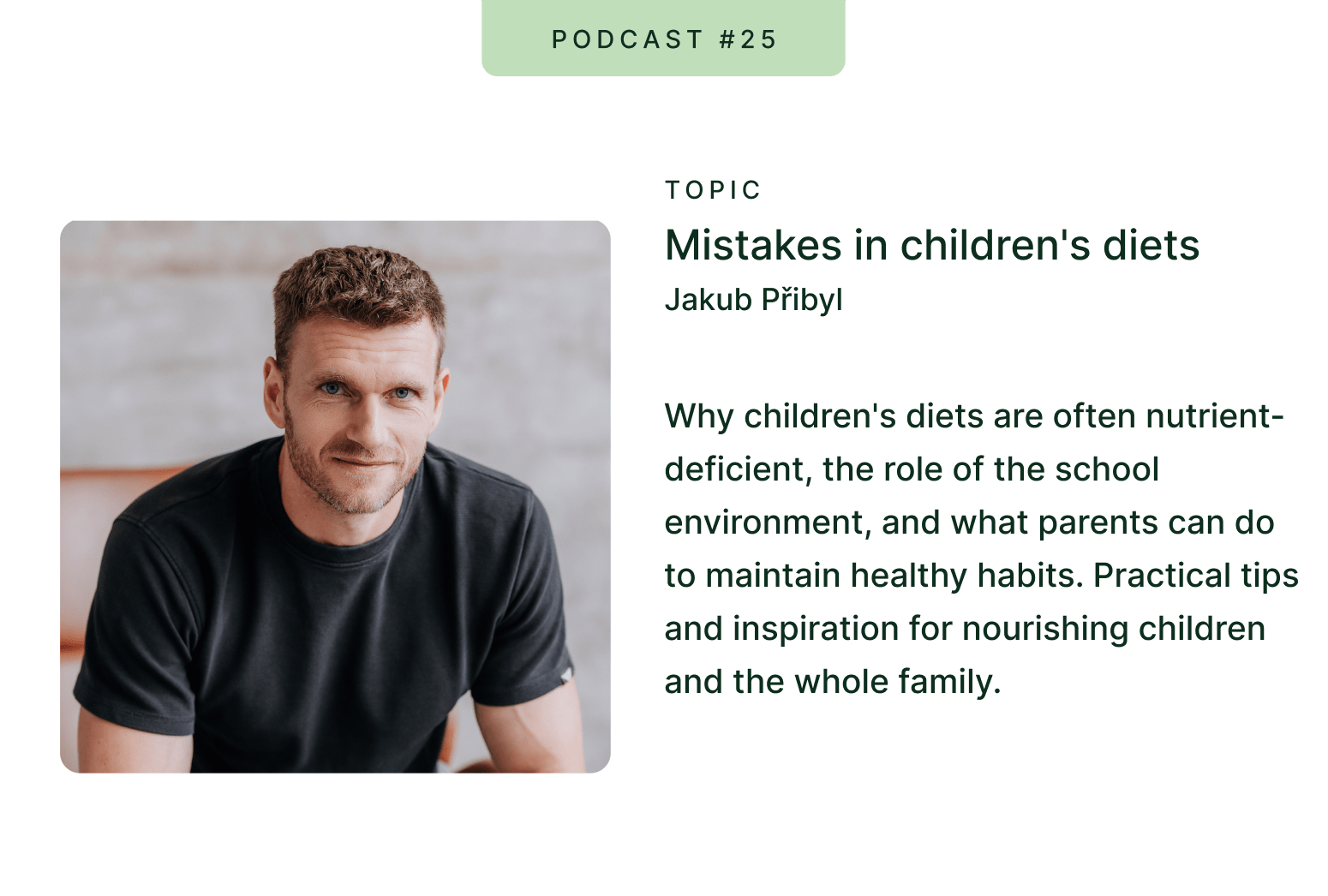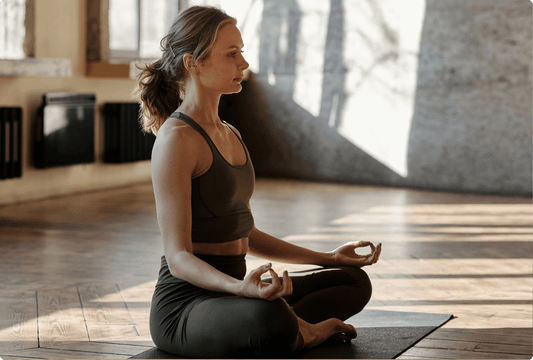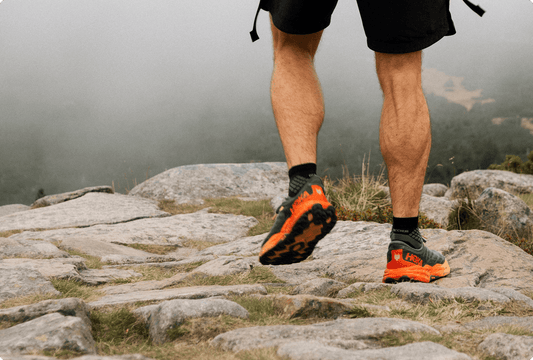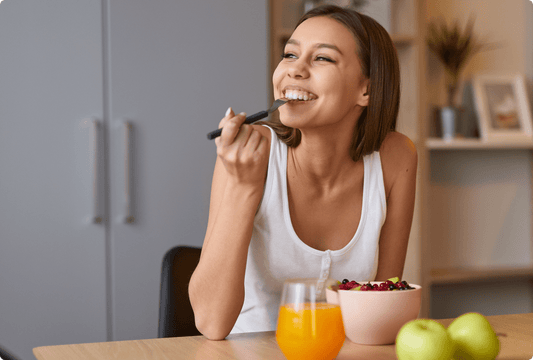W naszych podcastach uwielbiamy przedstawiać inspirujące historie ludzi, którzy – tak jak my – zwracają uwagę na detale, dbają o jakość składników i o ślad, jaki pozostawiają w naturze. W ten sposób pokazujemy naszym klientom produkty, które warto włączyć do codziennego życia – czy to mięso, sery, herbaty, zioła, czy inne produkty o realnej wartości dodanej.
W tym odcinku zabieramy Was do serca Čejkovic, gdzie odwiedziliśmy Sonnentor – rodzinną firmę, która od ponad 30 lat zajmuje się produkcją wysokiej jakości herbat i stopniowo poszerza swój asortyment – od ekologicznych przypraw i mieszanek przypraw po kawę i ekologiczne syropy.
Z właścicielem firmy, Josefem Dvořáčkiem, rozmawialiśmy o tradycji picia herbaty przekazanej nam w Czechach przez nasze babcie, o zrównoważonym rozwoju oraz o tym, jak zbudować firmę, która potrafi zachować swoje wartości i przekazywać je dalej.
Wszystkie odcinki podcastu Trime możesz śledzić na YouTube , Spotify lub Apple Podcasts
Podcast znajdziesz również na naszej stronie YouTube kanał.
Transkrypcja podcastu:
[00:00:04]
W naszych podcastach uwielbiamy przedstawiać inspirujące historie ludzi, którzy – tak jak my – zwracają uwagę na detale, dbają o jakość składników i o ślad, jaki pozostawiają w naturze. W ten sposób pokazujemy naszym klientom produkty, które warto włączyć do codziennego życia – czy to mięso, sery, herbaty, zioła, czy inne produkty o realnej wartości dodanej.
W tym odcinku zabieramy Was w samo serce Čejkovic, gdzie odwiedziliśmy Sonnentor, rodzinną firmę produkującą wysokiej jakości herbaty od ponad 30 lat i stopniowo rozszerzającą swój asortyment – od ekologicznych przypraw i mieszanek przypraw po kawę i ekologiczne syropy. Rozmawialiśmy z właścicielem, Josefem Dvořáčkiem, o tradycji picia herbaty przekazanej nam przez nasze babcie, o zrównoważonym rozwoju oraz o tym, jak zbudować firmę, która do dziś potrafi zachować swoje wartości i przekazywać je dalej.
00:00:10 Michal Kočí
Dzień dobry, dziś wyszliśmy ze studia i pojechaliśmy do Čejkovic, do Sonnentor. Siedzę naprzeciwko pana Dvořáčka, właściciela Sonnentor. Dzień dobry.
00:00:19 Josef Dvořáček
Dzień dobry.
00:00:21 Michal Kočí
Na początek, czy mógłbym prosić o prezentację Sonnentor dla tych, którzy mogą Cię nie znać? Czym dokładnie się zajmujesz?
00:00:27 Josef Dvořáček
Pomysł na firmę Sonnentor narodził się w 1988 roku w północnej Austrii. Pomysł założenia firmy skupującej zioła od lokalnych rolników ekologicznych wyszedł od Johannesa Gutmanna, który rozpoczął działalność w tym regionie, stopniowo pakując zioła w torebki i tworząc produkty z ładną etykietą i logo z uśmiechniętym słońcem.
Później, w Czechach, pomysł podchwycił Tomáš Mitáček i w 1992 roku wspólnie założyli czeski Sonnentor. Ja dołączyłem nieco później. Nie jesteśmy jednak typowym oddziałem firmy zagranicznej, w którym matka i córka tworzą spółkę – wszystkie zyski i pieniądze, które zarabiamy w Czechach, pozostają tutaj i mogą być reinwestowane. Jednocześnie korzystamy z dostępu do rynków zagranicznych, możemy eksportować nasze produkty i staramy się szerzyć ideę, że kupujemy zioła i przyprawy od lokalnych rolników ekologicznych, pakujemy je i sprzedajemy jako gotowe produkty – przyprawy, herbaty porcjowane lub sypane. Z czasem dodaliśmy kilka kolejnych produktów – dziś mamy własny projekt kawowy, sami palimy kawę, produkujemy organiczne syropy słodzone koncentratem jabłkowym i nasycone naszymi ziołami, a także kilka innych produktów uzupełniających. Krok po kroku się rozwijamy i przez 33 lata działalności w Čejkovicach dokładamy wszelkich starań, aby idea zrównoważonego rozwoju, począwszy od wysokiej jakości surowców organicznych, przenikała całą naszą działalność. Oznacza to, że myślimy o tym, gdzie działamy – nasza siedziba mieści się w odrestaurowanej starej oborze, na terenie poprzemysłowym – cała nasza firma, siedziba i produkcja, znajdują się tutaj, w Čejkovicach na wzgórzu. Myślimy również o energii – korzystamy z pomp ciepła, dążymy do budownictwa pasywnego, minimalizujemy zużycie energii itd. – i zastanawiamy się, w co pakujemy nasze produkty, dbając o to, aby opakowania nadawały się do kompostowania lub recyklingu, a najlepiej, aby nie zawierały plastiku, aby nie obciążać środowiska.
00:03:15 Michal Kočí
A torebki herbaty – czym się różnią od tych, które ludzie zazwyczaj kupują w supermarketach? Bo z pewnością mają wpływ na zdrowie, a oczywiście także na środowisko.
00:03:24 Josef Dvořáček
Dlatego, mówiąc o herbatach porcjowanych, o torebkach z herbatą, dużo myśleliśmy o tym, jak zminimalizować ilość opakowań. Zastanawialiśmy się, czy każda pojedyncza torebka herbaty rzeczywiście powinna być zapakowana w osobną papierową kopertę. Jednak podczas testów odkryliśmy, że gdy konsument otwiera pudełko, a torebka nie jest zapakowana w osobne opakowanie, aromaty znacząco ulatniają się, a jakość herbaty pogarsza się. Dlatego zdecydowaliśmy, że nawet jeśli wymaga to nieco więcej opakowań, warto zapakować każdą torebkę herbaty osobno, hermetycznie ją zamknąć, aby zachować aromat z organicznego surowca. A kiedy przeprowadziliśmy testy, nawet po dwóch lub trzech latach torebka nadal zachowywała swój aromat i była bardzo wysokiej jakości. Innym aspektem jest to, że obecnie używamy specjalnych papierów filtracyjnych, które są niebielone i niechlorowane, ponieważ bielone i chlorowane papiery mogą uwalniać chlor do herbaty w gorącej wodzie i zmieniać jej smak. Pomyśleliśmy również o tym, aby użytkownik mógł po zaparzeniu wrzucić torebkę bezpośrednio do domowego kompostownika. Oznacza to brak metalowych lub aluminiowych zszywek, które nadal są powszechne w niektórych starszych maszynach. Zadbaliśmy o to, aby woreczek był zszyty wyłącznie nicią. Żadnych zszywek, które uniemożliwiają kompostowanie, i oczywiście niepożądane jest, aby aluminium przedostawało się do gorącej wody. Oto podstawowe zasady dobrej jakości herbaty w porcjach – jak ją prawidłowo zapakować.
00:06:15 Michal Kočí
Myślę, że jest to również nieco droższe w porównaniu z tym, co produkują duże międzynarodowe korporacje. To rodzaj gwarancji, za którą klienci płacą dodatkowo. Czy masz problem z ceną, czy klienci akceptują i rozumieją, co kupują?
00:06:33 Józef Dvořáček
Zatem największa różnica w cenie, jeśli porównamy najtańszą herbatę z supermarketu z naszą, tkwi w samym surowcu. Koszt surowca organicznego jest od dwóch do pięciu razy wyższy niż koszt surowca konwencjonalnego. Muszę przyznać, że obecnie większość firm produkujących herbaty ziołowe lub owocowe intensywnie pracuje nad aromatami. Tworzą smak za pomocą specjalnych aromatów – zasadniczo związków chemicznych, które nadają herbatom smak jagód, truskawek lub malin. W ten sposób herbata jest bardzo tania, ale oczywiście nie ma to nic wspólnego z prawdziwym smakiem owoców.
00:08:01 Michal Kočí
Czy ta filozofia bezkompromisowej jakości była obecna od samego początku, czy też skrystalizowała się z czasem, gdy odkryłeś pułapki konwencji?
00:08:12 Josef Dvořáček
Nie, od samego początku mówiliśmy: ma to dla nas sens tylko wtedy, gdy możemy w 100% zagwarantować to, co pakujemy – coś, co moglibyśmy dać naszym dzieciom i wnukom. Każda herbata, która wychodzi z naszego ekspresu, musi być czymś , czego bronimy. Dlatego nie do pomyślenia było dla nas, aby pola, na których rosną nasze zioła, były traktowane herbicydami i pestycydami, które obciążają środowisko i przedostają się do wód gruntowych itd. Chcieliśmy, aby zioła były zbierane z miłością, bez chemikaliów, tradycyjnymi metodami. Dzisiaj możemy używać robotycznych pielników ze sztuczną inteligencją, które odróżniają zioła od chwastów – bardzo zaawansowanych narzędzi – ale chodzi o unikanie chemikaliów. Nie chodzi tylko o staromodną motykę, ale nadal, jeśli chodzi o stosowanie chemikaliów do zwalczania chorób, szkodników lub chwastów, jesteśmy całkowicie bezkompromisowi – dla nas kluczowe jest pozyskiwanie wyłącznie certyfikowanych ziół ekologicznych. … Wierzę, że każde grono konsumentów znajdzie swoją własną. Oczywiście, spotykamy też ludzi, którzy odwiedzają nasze centrum i mówią: pięknie tu, ale panie Dvořáček, jest pan złodziejem, sprzedaje pan herbatę za 95–100 CZK, jak normalny człowiek może sobie na to pozwolić? To naprawdę kwestia perspektywy. Porównałbym to do wina: niektórzy winiarze mówią, że ludzie narzekają na butelkę za 150 CZK, kiedy w Lidlu można kupić wino w kartonie za 30. To samo dotyczy herbaty – herbata z supermarketu za 20 CZK, a nasza, która jest na zupełnie innym poziomie jakości. Jeśli klienci cenią niską zawartość herbicydów i pestycydów, to dla nich; jeśli interesuje ich tylko cena, to nie. Taka jest rzeczywistość w jedzeniu: w porównaniu z rynkami zachodnimi Czesi wydają mniej swoich dochodów na jedzenie – więcej na samochody, mieszkania. Włosi na przykład nie potrzebują wielu wyjaśnień dotyczących cen. Widzę też, że młodsze pokolenie coraz bardziej interesuje się zdrowym stylem życia i zdrowiem planety. Dbają o to, co napędza ich organizm, co jedzą, jak firmy zachowują się wobec środowiska. To ma dla nich o wiele większe znaczenie niż dla kogoś, kto mówi: „Za 10 czy 20 lat mnie tu nie będzie, więc dlaczego miałbym się tym przejmować?”.
00:28:03 Michal Kočí
Oprowadzając nas po budynku, zwróciłeś uwagę na coś bardzo ważnego – wodę tutaj, w okolicy Čejkovic. Czy mógłbyś jeszcze raz wyjaśnić, jak to możliwe, że lokalna woda ze studni ma poziom zerowy, zwłaszcza że w innym niedawnym podcaście z panem Pohlmanem usłyszeliśmy, że ogólna jakość wody ze studni jest katastrofalna?
00:28:36 Josef Dvořáček
W Čejkovicach jest dużo winnic i szczerze mówiąc, regiony winiarskie należą do najgorszych pod względem stosowania herbicydów i pestycydów, ponieważ winnice są bardzo często opryskiwane. Większość z nich jest uprawiana konwencjonalnie, z częstymi opryskami, a ponieważ opryski dotyczą wysokich roślin, chemikalia mogą być przenoszone na setki metrów przy najmniejszym wietrze. W rezultacie wody gruntowe w regionach winiarskich są często zanieczyszczane. Jednak niedaleko Čejkovic, w miejscowości Velké Hostěrádky, współpracowaliśmy z gospodarstwem ekologicznym ProBio. ProBio prowadzi ekologiczne rolnictwo od około 15 lat, bez oprysków, na około 400 hektarach, a stopniowo dołączali do nich sąsiedzi rolnicy. Przekonali się, że ekologiczne rolnictwo jest możliwe nawet na dużą skalę, z uprawami takimi jak orkisz, gryka, pszenica, żyto, jęczmień, ziemniaki, z zastosowaniem płodozmianu. Z czasem dołączyło do nich coraz więcej osób i dziś „Bio region Hostěrádky” obejmuje prawie 3000 hektarów, wszystkie uprawiane ekologicznie, bez chemikaliów. Pamiętam jedno spotkanie dotyczące rolnictwa ekologicznego, siedząc przy jednym z naszych pól ziół. Przeszła obok młoda para z małymi dziećmi. Kobieta radośnie mnie powitała i powiedziała: „Wspaniale, jak tu gospodarujecie, bardzo dziękujemy. Uwielbiamy robić zdjęcia przy waszych kolorowych polach ziół. Ale co najważniejsze, kiedy urodziły się nasze dzieci, zbadaliśmy wodę w naszych studniach – i po 30 latach znów mamy w nich wodę o jakości odpowiedniej dla niemowląt”. Ta chwila uświadomiła mi, że nigdy tego nie planowaliśmy, nigdy nie uwzględniliśmy tego w naszych strategiach – ale rolnictwo ekologiczne ma dalekosiężne skutki, takie jak poprawa jakości wód gruntowych. I byłoby wspaniale, gdyby było więcej takich wiosek, gdzie ludzie mogliby pić wodę o jakości odpowiedniej dla niemowląt ze swoich studni.
00:31:25 Michal Kočí
Jak myślisz, dlaczego niektórzy ludzie – tacy jak ty – starają się robić wszystko najlepiej, jak to możliwe, podczas gdy inni widzą cierpienie zwierząt, opryskiwane pola i po prostu się tym nie przejmują? Wyobrażam sobie, że wielokrotnie prowadziłeś tę dyskusję. Jak postrzegasz fakt, że dla niektórych liczy się tylko zysk?
00:31:58 Josef Dvořáček
Myślę , że w dużej mierze wynika to z tego, że my, ludzie, oderwaliśmy się od natury. Nie spędzamy w niej zbyt wiele czasu i nie czujemy się już jej częścią. Mój ojciec był sadownikiem. Nauczył mnie szczepić stare drzewa owocowe i zajmować się pszczelarstwem. Choć czasami zbaczałem z ekologicznej ścieżki, zawsze nosiłem w sobie tę podstawową miłość do natury. Zauważyłem też, że ludzie, którzy kochają naturę, zazwyczaj kochają też innych ludzi – są zazwyczaj życzliwi i lubiani. Wielu harcerzy, których spotkałem, to wspaniali, sprawiedliwi ludzie, ukształtowani przez czas spędzony na łonie natury. To wychowanie zaszczepia w nich dożywotnią miłość do środowiska. Z drugiej strony, wielu ludzi jest całkowicie oderwanych od natury. A dziś widzimy konsekwencje kryzysu klimatycznego: przemysł zapomina, że nie możemy wrzucać wszystkiego do rzek, bo rzeki to żywe organizmy. Nie możemy po prostu wypuścić wszystkiego do powietrza, bo wszystko do nas wraca – poprzez choroby, poprzez szkody w środowisku. Jesteśmy częścią natury, a to zrównoważony system. Nie możemy patrzeć na to egoistycznie, tylko po to, by osiągnąć krótkoterminowy zysk. Musimy zdać sobie sprawę, że jesteśmy częścią natury i musimy ją szanować.
00:35:15 Michal Kočí
To ciekawe. Kilka miesięcy temu przeczytałem na Twoim profilu na LinkedIn, że minęło 10 lat, odkąd o mało nie wsiadłeś do samolotu, który się rozbił. Czy to doświadczenie miało na Ciebie wpływ?
00:35:29 Josef Dvořáček
Tak, absolutnie. W tym roku minęło dziesięć lat. Jeśli mogę podzielić się historią ze słuchaczami… Moja żona i ja mamy trójkę dzieci i mieliśmy taką tradycję, że od czasu do czasu spędzaliśmy weekend tylko z jednym dzieckiem na raz, ponieważ w grupie dzieci zachowują się inaczej i nie ma takiej bezpośredniej więzi. Mój syn był wielkim fanem FC Barcelony, więc zaplanowałem dla nas wyjazd na mecz Barcelony z Realem Madryt w marcu 2015 roku, połączony z wizytą na pobliskiej ekologicznej farmie w Hiszpanii. Chcieliśmy, żeby to był wyjątkowy weekend. W ostatniej chwili odwołaliśmy – dzięki mojej żonie. Byłem wtedy zdenerwowany. Wciąż pamiętam, jak oglądaliśmy mecz w domu w niedzielny wieczór – Barcelona wygrała 2:1 – i oboje z synem byliśmy rozczarowani, że nas tam nie będzie. Ale w czwartek, kiedy czyściłem e-maile, zdałem sobie sprawę, że mój syn i ja mamy bilety na lot Germanwings, którym chory psychicznie pilot celowo rozbił samolot we francuskich Alpach. Nikt nie przeżył. W niedzielę wieczorem uświadomiłem sobie, że byłem zły na żonę – a w czwartek zrozumiałem, że w zasadzie odrodziliśmy się. Kiedy przechodzisz przez coś tak głębokiego, zaczynasz myśleć inaczej: co bym zrobił, jak bym żył i pracował, gdybym wiedział, że jutro mogę umrzeć? Nagle wielkość firmy, zarobione pieniądze, datki na cele charytatywne, obecność w Forbesie – to wszystko nie ma znaczenia. Liczą się relacje z bliskimi i ślad, jaki po sobie zostawiamy. To doświadczenie nauczyło mnie, że życie jest krótkie, każdy dzień jest darem i mamy obowiązek traktować innych i świat w sposób, który czyni go choć trochę lepszym.
00:39:05 Michal Kočí
To niezła historia. Może nawet odcisnęła piętno na tym budynku, w którym siedzimy. Czy mógłbyś powiedzieć słuchaczom, czego mogą się spodziewać, jeśli przyjdą na wycieczkę? Ten budynek jest jednym z najbardziej ekologicznych w kraju, prawda?
00:39:35 Josef Dvořáček
Około 2016–2017 roku zdaliśmy sobie sprawę, że nasza siedziba w Sonnentor staje się zbyt ciasna. Zbudowaliśmy ją na terenie poprzemysłowym – starej, zrujnowanej obory – a do 2012 roku otworzyliśmy ją jako centrum dla zwiedzających, „Ziołowy Raj”, aby turyści mogli zobaczyć, jak powstaje herbata. Zapotrzebowanie było duże, więc chcieliśmy, aby wycieczki były bezpieczniejsze i bardziej profesjonalne – na przykład, aby uniemożliwić zwiedzającym wjazd wózkiem widłowym do magazynu. Wraz z architektami, pracownikami produkcji i logistyki rozpoczęliśmy projektowanie budynku, który spełniałby najsurowsze kryteria zrównoważonego rozwoju i ekologii. Tak powstał nasz budynek Solis – „słońce” – który w 2022 roku zdobył nagrodę dla najbardziej zrównoważonego budynku przemysłowego w Europie Środkowej. Dzięki temu uzyskaliśmy również korzystny kredyt itp. Jesteśmy z niego dumni: zachowuje się niemal jak budynek pasywny, zużywa minimalną ilość energii, ma pompy ciepła, gliniany tynk, przegrody z recyklingu – wszystko z materiałów zrównoważonych. Usprawniliśmy również produkcję, skracając drogę od ścinania ziół do pakowania, co pozwala lepiej zachować aromat. Zbudowaliśmy specjalny tunel z trasą turystyczną, dzięki czemu odwiedzający mogą dosłownie przejść i zobaczyć, jak powstają herbaty. Ta transparentność pomaga nam zachować dyscyplinę – wszystko musi być czyste i schludne, bo odwiedzający widzą wszystko. W przeciwieństwie do wielu firm spożywczych, które pozostają zamknięte, otworzyliśmy się i to nas udoskonala. Odwiedzający to doceniają, a wielu z nich staje się stałymi klientami, widząc różnicę na własne oczy.
00:42:45 Michal Kočí
Muszę polecić. Widziałem kilka zdjęć przed wizytą i pomyślałem, że wygląda ładnie, ale nie zdawałem sobie sprawy, jaki jest duży. Cała wystawa jest tego warta. Ile osób odwiedza Cię w Čejkovicach?
00:43:09 Josef Dvořáček
Byliśmy naprawdę zaskoczeni. W zeszłym roku odwiedziło nas około 80 000 turystów. W pewnym sensie konkurujemy więc z profesjonalnymi ośrodkami turystycznymi. Zatrudniamy około 25 osób na pełen etat w branży turystycznej, a także pracowników sezonowych w kawiarniach, sklepach i programach rodzinnych. Pomaga nam to również promować naszą markę bez polegania na markach własnych supermarketów. Zamiast tego możemy wspierać wysokiej jakości czeskich rolników i plantatorów ziół, utrzymywać wysokie standardy i unikać kompromisów związanych z kupowaniem ziół niższej jakości tylko po to, by zadowolić sieć handlową.
00:45:10 Michal Kočí
W sektorze zdrowia i wellness niektóre firmy radzą sobie dobrze, ale nie zawsze odnoszą sukcesy finansowe. Ty jednak odnosisz sukcesy i zatrudniasz wielu ludzi. Jesteś silny również za granicą – co jest rzadkością. W którym kraju jesteś najsilniejszy i dlaczego Twoim zdaniem klienci za granicą są zainteresowani Twoimi produktami?
00:45:45 Josef Dvořáček
Przez 33 lata zbudowaliśmy bardzo silną pozycję w segmencie ekologicznym za granicą. Dziś Sonnentor znajduje się w czołówce 3-4 najważniejszych marek w Europie. Ponieważ nigdy nie dostarczaliśmy do międzynarodowych korporacji, staliśmy się bardzo poszukiwani przez wyspecjalizowane sklepy i markety ekologiczne (sklepy o powierzchni 200-300 m², które sprzedają wyłącznie produkty ekologiczne). Dlatego teraz dystrybuujemy w całej UE. Nasze obroty wynoszą około 480 milionów koron czeskich i prawdopodobnie przekroczymy pół miliarda w tym roku. Połowa z nich jest sprzedawana w Czechach, a połowa eksportowana – głównie do krajów niemieckojęzycznych: Niemiec, Austrii, Szwajcarii i północnych Włoch. Ich kuchnia i tradycje są podobne do naszych – herbaty i zioła, których używały ich babcie, są podobne do naszych. W Polsce czy Wielkiej Brytanii ludzie piją mniej herbat ziołowych, pod wpływem kultury picia czarnej i zielonej herbaty, więc odnosimy tam mniejszy sukces. Ale w krajach niemieckojęzycznych jesteśmy jedną z dwóch czołowych marek herbat i przypraw.
00:47:10 Michal Kočí
To świetnie. Często mam wrażenie, że marki lub ludzie, którzy dobrze sobie radzą, twierdzą, że nie radzą sobie dobrze finansowo, bo nalegają na jakość. Nie sądzę, żeby te rzeczy się wykluczały – zdaje się, że to udowadniasz. Co o tym sądzisz? Oczywiście, czasami trzeba się wycofać ekonomicznie, żeby zachować jakość, to jasne, ale dla mnie to nie jest sprzeczność. A może jednak?
00:47:40 Josef Dvořáček
Muszę przyznać, że mieliśmy trochę szczęścia – mamy austriackiego partnera, dzięki czemu dostęp do rynku austriacko-niemieckiego był łatwiejszy. W Czechach znaczna część żywności jest sprzedawana wyłącznie za pośrednictwem międzynarodowych sieci. Dlatego nawet wysokiej jakości czeskie firmy bio mówią mi: „Josef, musimy sprzedawać do sieci – kupiliśmy maszynę do prawidłowego mielenia i pakowania, a teraz potrzebujemy większej ilości”. Ale sprzedaż do sieci to błędne koło – naciskają na cenę, a często tak naprawdę nie dbają o jakość; wystarczy „pieczątka” certyfikacyjna. W naszej pracy często widzę, że zioła w tych supermarketowych markach bio mogą mieć 6–8 lat – zupełnie nie przypominają naszych świeżych ziół.
00:49:25 Michal Kočí
Myślę, że większość rolników, których spotykamy, zgodziłaby się z tym: albo stworzysz własne kanały sprzedaży, albo sieci cię zjedzą.
00:49:35 Josef Dvořáček
Chodzi też o cierpliwość. Jeśli przyjdziesz dziś do Sonnentor, zobaczysz firmę, którą budowaliśmy krok po kroku przez 33 lata, reinwestując w nią każdą koronę. Potem pojawia się młody człowiek i po trzech latach mówi: „To za trudne, musimy iść do sieci”. Sprzedajemy dużo do małych sklepów, mamy terenowy zespół sprzedaży i możemy kompletować i pakować zamówienia o wartości zaledwie 3000 CZK. Ale patrząc na całość, żaden pojedynczy klient nie odpowiada za więcej niż 5% naszych obrotów. Ta dywersyfikacja jest kluczowa, aby nikt nie mógł nas trzymać za gardło – nikt nie może powiedzieć: „Mamy 50% twojego biznesu i odchodzimy” i zostawić nas z nieużywanymi maszynami i zakupionymi ziołami, których nie możemy ruszyć.
00:51:00 Michal Kočí
Jeśli klient chce Cię znaleźć, gdzie może kupić Twoje produkty? Czy masz mapę małych sklepów na swojej stronie internetowej, czy jest to głównie Twój sklep internetowy?
00:51:20 Josef Dvořáček
Dziś sprzedajemy za pośrednictwem własnych kanałów: nasze centrum dla zwiedzających „Ziołowy Raj” w Čejkovicach z dużym sklepem i trasą zwiedzania, gdzie można kupić sadzonki i wziąć udział w degustacjach; mamy kawiarnię degustacyjną i herbaciarnię – dokładnie taki rodzaj doskonałości, jaki chciałbym odtworzyć w dużych miastach, ale czynsze za sklepy w Czechach są bardzo wysokie. Prowadzimy więc własne sklepy – w Brnie i Pradze – przygotowujemy się do otwarcia w Ołomuńcu i chcielibyśmy stopniowo powiększać się o dwa lub trzy sklepy rocznie. Mamy też sklep internetowy – klienci wybierają, co chcą, i otrzymują to w ciągu dwóch dni. Mamy również sieć tzw. sklepów partnerskich – sklepów z Sonnentor shop-in-shop, piękną grafiką; dostarczamy produkty i know-how oraz szkolimy ich personel (przyjeżdżają do Čejkovic na wycieczki i degustacje). Jest około stu takich sklepów partnerskich, plus sieć sklepów ze zdrową żywnością i żywnością ekologiczną – bardzo ważne kanały. A potem segment prezentów — księgarnie, centra ogrodnicze, sklepy z upominkami. Staramy się, aby nasze etykiety były miłe, zabawne, radosne i dobrze opisane. Zamiast „herbaty na przeziębienie” mamy „Pierożek w gardle”. Chcemy emocji — nie kolejnej „herbaty na oskrzela czy prostatę”. Na katar u dzieci mamy „Usmrkánek”, na przeziębienie „Kuc kuc”, a potem mamy „Dobry nastrój”, „Anioł Stróż”, „Harmonia rodzinna”. Ludziom podoba się, że herbata niesie emocje — i są zaskoczeni, że w prezencie jest coś, czego się nie spodziewali: fantastyczna herbata. Dają nam świetne opinie — wielu z nich zostaje stałymi klientami.
00:53:00 Michal Kočí
Dam ci opinię o Nerve Balm . Czasami, gdy sprawy się nawarstwiają, myślę: potrzebuję tego dzisiaj.
00:53:08 Josef Dvořáček
Tak, należy do naszych najlepiej sprzedających się herbat. Właściwie tutaj, w Czechach – więc może to chwytliwa nazwa, a może nasze nerwy naprawdę jej potrzebują.
00:53:12 Michal Kočí
Zwłaszcza zimą, kiedy nie ma dużo słońca. Super. A tak przy okazji, ile masz tych produktów?
00:53:17 Josef Dvořáček
Oferujemy ponad 600 produktów – głównie mieszanki przypraw; herbaty ziołowe, czarne, owocowe, zielone i rooibos; herbaty dla dzieci; porcjowane i sypkie – oraz wiele innych produktów zawierających nasze zioła lub przyprawy. Mamy buliony warzywne do zup; organiczne syropy słodzone wyłącznie sokiem jabłkowym – nierafinowanym cukrem – które cieszą się dużą popularnością i są wzbogacone naszymi ziołami. Prowadzimy również własne projekty kawowe w Nikaragui i Peru, więc mamy również linię kawową. Jest wiele produktów, ale około 200 to prawdziwe bestsellery. Można je kupić w wyspecjalizowanych sklepach ekologicznych w całej Europie, co bardzo mnie cieszy. Mój znajomy był na światowych targach w Japonii, a potem pojechał na Okinawę i przysłał mi zdjęcia naszych herbat z japońskimi etykietami – to umiliło mi dzień. Sprzedajemy tam tylko trochę — może 20–30 tysięcy euro — to raczej wisienka na torcie, ale miło, że „uczymy” Japończyków picia herbat ziołowych, mimo że Japonia jest mekką herbaty — głównie zielonej.
00:54:15 Michal Kočí
I przetłumaczyliście etykiety na 55 języków?
00:54:17 Josef Dvořáček
Tak. Znajdziesz etykiety w języku hebrajskim (dostawy do Izraela), Japonii, Nowej Zelandii, Australii, różnych krajów azjatyckich, oczywiście w Stanach Zjednoczonych, a następnie we wszystkich krajach europejskich.
00:54:50 Michal Kočí
To wspaniale. Panie Dvořáček, bardzo dziękuję za poświęcony czas. Nasi słuchacze często pytają nas, gdzie kupić dobry ser i tak dalej, i mogę powiedzieć, że w naszym biurze prawie każdy ma w szufladzie pańską herbatę – więc możemy za nią ręczyć i ją polecać. Dziękuję za to, co Pan robi i mam nadzieję, że znajdzie Pan dla nas jeszcze czas – może nagramy kolejny odcinek o herbatach, przyprawach i tym podobnych.
00:55:08 Josef Dvořáček
Dziękujemy za wizytę — a jeśli jesteście Państwo zainteresowani, zapraszamy do naszego centrum dla zwiedzających w Čejkovicach koło Hodonína. Dowiecie się tam, jak rozpoznać dobrą herbatę.
00:55:16 Michal Kočí
Gorąco polecam — idę na zakupy. Trzymajcie się. Do widzenia.
00:55:18 Josef Dvořáček
Do widzenia.












